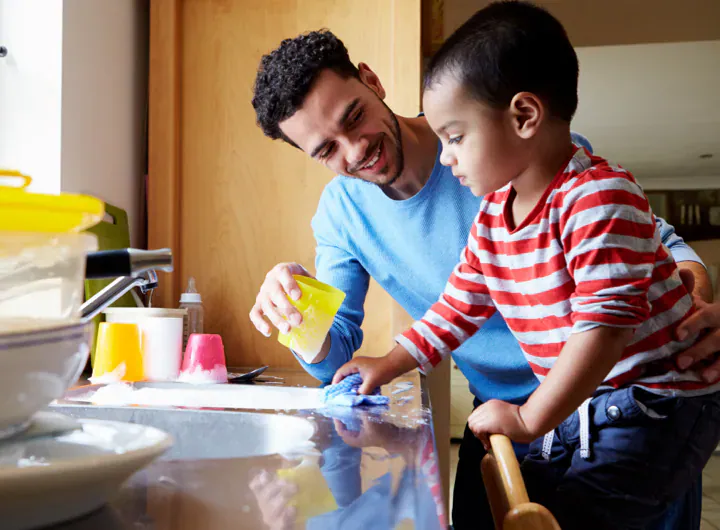Chores for kids: Age-appropriate tips and strategies

Let's talk about something most parents and carers can relate to – chores for kids.
Most dream of kids willingly cleaning up after themselves, helping with jobs around the home, and maybe even being happy to do it.
But that's not always the case, and it can be frustrating when you trip over another pile of things that have been left out, or have to remind your kids time and time again to tidy up after themselves.
Here are some realistic ideas for encouraging children to cooperate with household chores, along with the not-so-obvious advantages. And if you're curious about age-appropriate chores for kids, you’ll find ideas for all stages of development.
How important is it for kids to do chores around the house?
You might wonder: are chores beneficial to children or just the parents? Why should kids do chores?
There’s no doubt about it – kids helping to sweep the floor, wash the car or set the table can lighten the load for parents and help them feel calmer in busy times. Most importantly, though, chores can help children learn essential life skills.
When children are at a young age, it’s may feel easier in the moment to do things yourself. However, it's important to let them do things for themselves as soon as they’re ready.
Age-appropriate chores can help kids become more responsible and learn that family members pitch in to keep things running smoothly.
Chores can help children learn skills in time management, perseverance and problem-solving. This can benefit them both at home and in school.
Chores can also teach children relationship skills, like empathy. When kids help out, they often start to notice that people around them sometimes need help, like a sibling, a grandparent or neighbours.
When children complete a chore, it can give them a real sense of independence and accomplishment that, in turn, boosts their confidence.
How to get kids to do chores without nagging
Plan ahead
If you're parenting with a partner, agree on what you expect before having a chat with your children. Think about what chores need to be done, and what your child could do independently, or with a little guidance.
Be realistic about what they're able to do and keep in mind that it may take some time for them to learn how to do the job.
Involve your children
For young children, it can help to involve them with small tasks to introduce them to the concept of helping. For example, you could ask your toddler to put away their blocks while you tidy the rest of the room.
As they get older, it's a good idea to have a family chat about simple chores at home. If they have siblings, introduce them all to chores at the same time, as it can be easier for children to accept new responsibilities when they don't feel singled out.
Instead of calling them chores, you could talk about "contributions", “helping out” or “jobs to do”.
Let them help decide which jobs they can handle on their own, considering their age and abilities. Rather than making all the decisions yourself, start small and ask everyone to contribute their ideas.
Break things down into smaller tasks
For example, if your child is young, they might find it a bit overwhelming to set the table. Instead, you could give them a smaller ‘chunk’ of responsibility, like laying out the cutlery.
As they grow older, they can take on more complex tasks.
Timing can be everything
If you ask a grumpy, tired (or hungry!) child to help with household chores, they're likely to say no or even ignore you.
Instead of giving instructions when things need to be done, try to plan a conversation and negotiation when everyone is rested and calmer.
Notice and praise
When it comes to children, the behaviour that gets a parent’s attention is the behaviour they’re likely to repeat.
When you notice and praise cooperative behaviour, it can encourage kids to do it again.
For example, "Hey, thanks for helping with that meal preparation. You did a great job chopping up the vegetables. And it tasted delicious!”
Chore charts for kids
Start with one, two or three simple jobs per week, and you might like to write them down on a chore chart that everyone can see.
Chore charts help kids feel proud when they finish their jobs and can help everyone stay organised. There are many different examples available, depending on what works best for your family. However, it doesn't necessarily have to be a chart only for chores.
The Triple P Online program includes an example “reward chart” that can be used to encourage cooperation and help kids learn new skills. You can reward them with stars, stamps, stickers or smiley faces to help them feel good about what they’ve done, and gradually phase out rewards as they get older and more responsible.
What about pocket money for kids?
Pocket money can be a great motivator and also helps kids to learn the relationship between effort and reward, and the value of budgeting and saving.
The amount you choose could depend on their age, your budget, and what might be helpful to you around the home.
For younger children, a small amount of pocket money is enough. As they grow older, you may prefer to give them a little more, or link the amount to certain household chores. It's also a good idea to set some basic rules around what they will and won't be rewarded for.
If the idea of pocket money doesn’t suit your family, other rewards could include a fun family activity, a little extra screen time, or letting them choose their favourite meal – it’s up to you.
Rewards and incentives aside, let them know their contributions really do make a big difference to the family.
What are some age-appropriate chores for kids?
You might be wondering: when should you give your kids chores? Here are some examples of tasks suitable for different ages:
Toddlers: put away some toys, water a plant, put dirty clothes into the laundry basket, wipe down a surface, bring their empty bowl back to the kitchen.
Preschool age: help set the table, sweep a small area, fill a pet’s water bowl, match socks while folding laundry.
School-age kids: vacuum or sweep a bigger area, put clean laundry away, pack their school bag or make their bed.
Tweens and teens: wash the car, clean the bathroom, simple grocery shopping or meal preparation, doing laundry and folding clothes.
Every child is different, and the chores they do can depend on their skills, interest and motivation.
Chores for kids and realistic expectations
Maybe you’re thinking: do kids actually do chores?
Most kids really do love to help. Especially when they’re toddlers and keen to do more things for themselves.
Even when kids don't do things exactly how we want them to, giving them the space and time to try shows them their contribution matters.
The key is to give them opportunities to help as soon as they’re ready, show them the steps, and to be patient while they learn. Focus on building a strong relationship and keeping calm.
Things will take longer, and there will be spills, dust, mess and dishes stacked in a not-so-ideal way – and that’s okay!
What really matters is encouraging their participation, not perfection.
Get a toolkit of proven strategies to raise capable, cooperative kids with Triple P Online or Teen Triple P Online.

